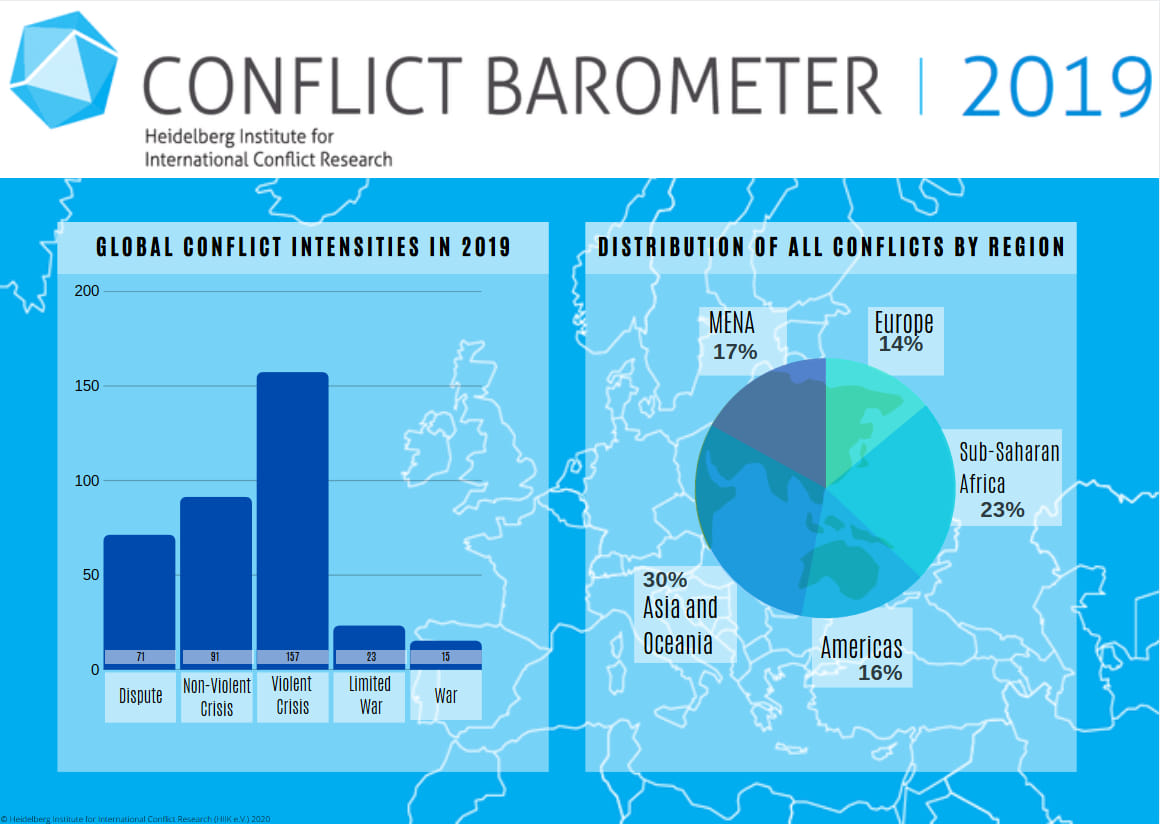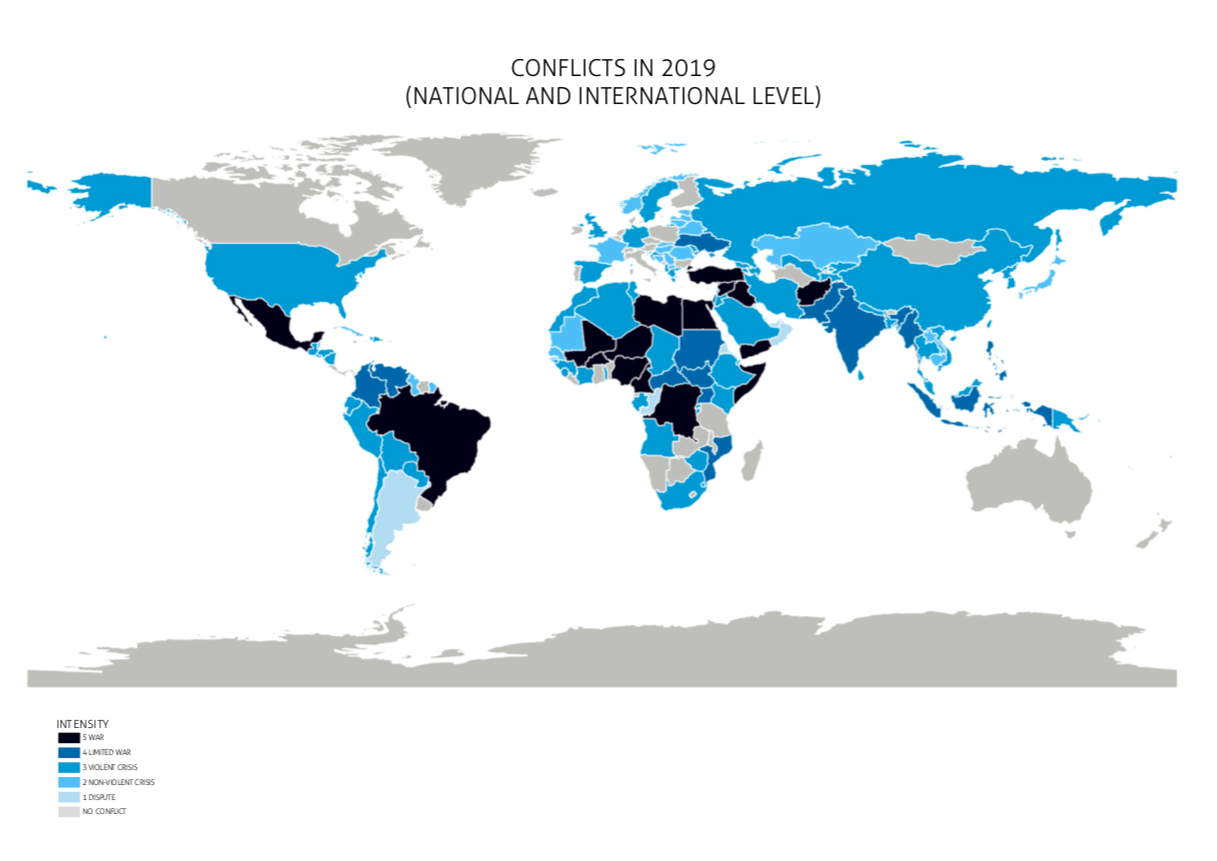Report about the recent global conflict developments
358 conflicts worldwide – the Heidelberg Institute for International Conflict Research publishes the Conflict Barometer 2019
The Heidelberg Institute for International Conflict Research (HIIK) presents the 28th edition of its annual world report: the Conflict Barometer 2019. The Conflict Barometer contains in-depth analysis of political conflict dynamics worldwide, including violent as well as non-violent conflicts. According to the HIIK methodology, violent conflicts are differentiated according to their intensity into violent crises (3), limited wars (4) and wars (5). A further distinction is made between non-violent crises (2) and disputes (1). The intensity is composed of the observed conflict means (personnel, use of weapons) and the conflict consequences (casualties, refugees, destruction). The Heidelberg methodology makes political conflicts globally comparable. The report is completed by conflict maps and graphs as well as accounts of conflict resolution. Moreover, spotlight articles analyse specific conflict dimensions and their influence on political realities.
In 2019, HIIK observed a total of 358 conflicts worldwide. While 162 conflicts were non-violent, 196 were fought violently. Compared to 2018, the overall number of full-scale wars decreased slightly from 16 to 15. Of these, the drug trafficking conflict in Brazil, two intrastate conflicts in the DR Congo, as well as the conflict spurred by Islamist groups in the Sahel zone escalated to wars. While eleven wars continued, five wars de-escalated to either limited wars or violent crises. In total, 23 limited wars were observed worldwide. The observation of four conflicts was ended either due to active settlement by the conflict parties or two-year-long inactivity. The HIIK classifies and defines political conflicts among others according to conflict types, conflict actors and conflict items. While the most common conflict type is the intrastate conflict, the most frequent conflict item is the debate about the political or ideological orientation of the political system.

The Middle East and Maghreb remained the region with the highest number of full-scale wars, taking place in Syria, Libya, Egypt, Yemen, Turkey, and Afghanistan. Yet, Syria’s inter-opposition conflict de-escalated to a limited war. In particular, the newly flared up opposition conflicts in the region, such as in Iraq and Iran, were in the focus of worldwide media attention. In Sub-Saharan Africa, the number of wars as well as limited wars decreased slightly. Besides the two wars in the DR Congo and the transstate conflict in the Sahel zone, the two wars involving Islamist Boko Haram factions in Nigeria and al-Shabaab in Somalia continued. Two wars were fought in the Americas. Alongside the drug trafficking conflict in Brazil, fighting between drug cartels, vigilante groups, and the government in Mexico continued. Moreover, three limited wars took place, comprising inter-cartel violence in Mexico and another two conflicts in Colombia. The opposition conflict in Nicaragua, however, de-escalated to a violent crisis. For the second consecutive year, no war was observed in Asia and Oceania, while the number of limited wars decreased from seven to five. Tensions between India and Pakistan continued when in February the first air strikes were conducted since 1971. Two limited wars in the Philippines continued, while the conflict between the Arakan Army and the government in Rakhine State in Myanmar and the Papuan independence conflict in Indonesia escalated to limited wars. In Europe, no war was observed, whereas the limited war in the Donbas region in Ukraine continued.

In the Spotlight Texts section, guest authors and members of the institute analyze further conflict aspects. For example, while Kerstin Zettl elaborates on the role of cyber attacks in 2019, Alexey Yusupov examines the effects of international sanctions on Myanmar’s minority policy.
Due to the general risk situation of the Covid19 virus and due to our responsibility towards our members and invited guests, the originally planned press conference at Heidelberg University did not take place. Instead, our regional experts are available for questions and short interviews.
Founded in 1990, the HIIK celebrates its 30th anniversary this year. Since then, the institute has dedicated itself to researching and documenting intra-, inter-, trans- and substate conflicts worldwide. More than 200 young researchers work at HIIK on a voluntary basis. The HIIK presents its research results in the annual conflict barometer, which is open access and can be downloaded at www.hiik.de.
Visit us on Facebook and Twitter!
Facebook: Heidelberger Institut für Internationale Konfliktforschung (HIIK)
Twitter: @HIIK_eV


